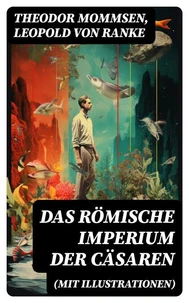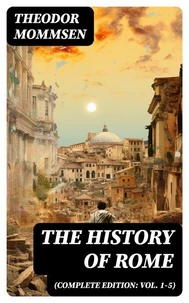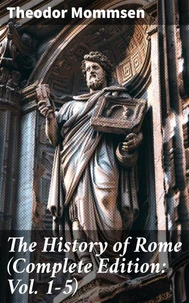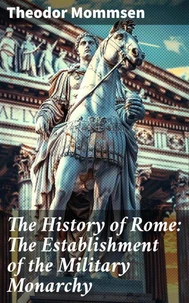The History of Rome: From the Abolition of the Monarchy in Rome to the Union of Italy. A Comprehensive Journey Through Ancient Roman Transformation
Par : ,Formats :
Disponible dans votre compte client Decitre ou Furet du Nord dès validation de votre commande. Le format ePub est :
- Compatible avec une lecture sur My Vivlio (smartphone, tablette, ordinateur)
- Compatible avec une lecture sur liseuses Vivlio
- Pour les liseuses autres que Vivlio, vous devez utiliser le logiciel Adobe Digital Edition. Non compatible avec la lecture sur les liseuses Kindle, Remarkable et Sony
 , qui est-ce ?
, qui est-ce ?Notre partenaire de plateforme de lecture numérique où vous retrouverez l'ensemble de vos ebooks gratuitement
Pour en savoir plus sur nos ebooks, consultez notre aide en ligne ici
- Nombre de pages279
- FormatePub
- ISBN859-65--4750660-7
- EAN8596547506607
- Date de parution12/08/2023
- Protection num.Digital Watermarking
- Taille801 Ko
- Infos supplémentairesepub
- ÉditeurGOOD PRESS
Résumé
In "The History of Rome: From the Abolition of the Monarchy in Rome to the Union of Italy, " Theodor Mommsen meticulously chronicles the rise of the Roman Republic and the transformative events that shaped the Italian peninsula. Utilizing a blend of narrative history and scholarly analysis, Mommsen employs a rhythmic prose style that captures the grandeur and complexity of Rome's political and social evolution.
The book is set against the backdrop of 19th-century Europe, reflecting themes of nationalism and unity that resonated with contemporary audiences, particularly during the period of Italian unification. Mommsen, a distinguished historian and Nobel laureate, drew from his extensive knowledge of classical studies and his own German academic milieu to craft this comprehensive account. His background in law and history particularly fueled his interest in the political machinations of ancient Rome, leading him to explore themes of governance that were strikingly relevant to the political landscape of his time.
This duality of scholarly rigor and passionate engagement underlies much of his work, contributing to his lasting impact on historical scholarship. This book is highly recommended for both history enthusiasts and scholars seeking an in-depth understanding of Rome's transition from monarchy, through republicanism, to its eventual role in the unification of Italy. Mommsen's eloquent narrative, combined with his rigorous analysis, provides readers with a profound appreciation for the complexities of ancient civilization and its enduring legacy.
The book is set against the backdrop of 19th-century Europe, reflecting themes of nationalism and unity that resonated with contemporary audiences, particularly during the period of Italian unification. Mommsen, a distinguished historian and Nobel laureate, drew from his extensive knowledge of classical studies and his own German academic milieu to craft this comprehensive account. His background in law and history particularly fueled his interest in the political machinations of ancient Rome, leading him to explore themes of governance that were strikingly relevant to the political landscape of his time.
This duality of scholarly rigor and passionate engagement underlies much of his work, contributing to his lasting impact on historical scholarship. This book is highly recommended for both history enthusiasts and scholars seeking an in-depth understanding of Rome's transition from monarchy, through republicanism, to its eventual role in the unification of Italy. Mommsen's eloquent narrative, combined with his rigorous analysis, provides readers with a profound appreciation for the complexities of ancient civilization and its enduring legacy.
In "The History of Rome: From the Abolition of the Monarchy in Rome to the Union of Italy, " Theodor Mommsen meticulously chronicles the rise of the Roman Republic and the transformative events that shaped the Italian peninsula. Utilizing a blend of narrative history and scholarly analysis, Mommsen employs a rhythmic prose style that captures the grandeur and complexity of Rome's political and social evolution.
The book is set against the backdrop of 19th-century Europe, reflecting themes of nationalism and unity that resonated with contemporary audiences, particularly during the period of Italian unification. Mommsen, a distinguished historian and Nobel laureate, drew from his extensive knowledge of classical studies and his own German academic milieu to craft this comprehensive account. His background in law and history particularly fueled his interest in the political machinations of ancient Rome, leading him to explore themes of governance that were strikingly relevant to the political landscape of his time.
This duality of scholarly rigor and passionate engagement underlies much of his work, contributing to his lasting impact on historical scholarship. This book is highly recommended for both history enthusiasts and scholars seeking an in-depth understanding of Rome's transition from monarchy, through republicanism, to its eventual role in the unification of Italy. Mommsen's eloquent narrative, combined with his rigorous analysis, provides readers with a profound appreciation for the complexities of ancient civilization and its enduring legacy.
The book is set against the backdrop of 19th-century Europe, reflecting themes of nationalism and unity that resonated with contemporary audiences, particularly during the period of Italian unification. Mommsen, a distinguished historian and Nobel laureate, drew from his extensive knowledge of classical studies and his own German academic milieu to craft this comprehensive account. His background in law and history particularly fueled his interest in the political machinations of ancient Rome, leading him to explore themes of governance that were strikingly relevant to the political landscape of his time.
This duality of scholarly rigor and passionate engagement underlies much of his work, contributing to his lasting impact on historical scholarship. This book is highly recommended for both history enthusiasts and scholars seeking an in-depth understanding of Rome's transition from monarchy, through republicanism, to its eventual role in the unification of Italy. Mommsen's eloquent narrative, combined with his rigorous analysis, provides readers with a profound appreciation for the complexities of ancient civilization and its enduring legacy.










